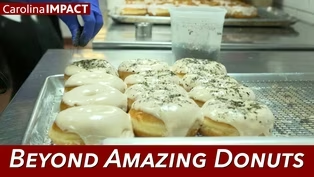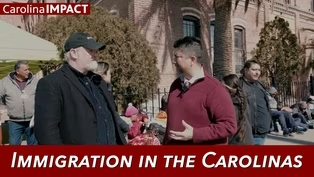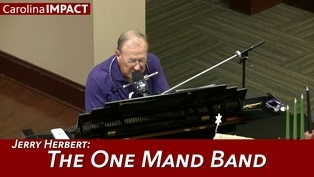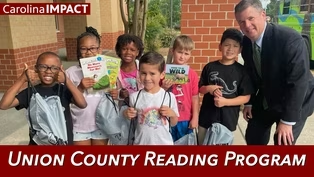
Carolina Impact: January 23rd, 2024
Season 11 Episode 1112 | 25m 26sVideo has Closed Captions
Immigration in the Carolinas, Union Co. Reading, Beyond Amazing Donuts, & Jerry Herbert
How immigration is affecting the Carolinas, Local superintendent is dedicated to program that helps students become stronger readers, meet a talented entrepreneur in Charlotte, known for her incredible donut creations, & meet Jerry Herbert, the one man band.
Problems playing video? | Closed Captioning Feedback
Problems playing video? | Closed Captioning Feedback
Carolina Impact is a local public television program presented by PBS Charlotte

Carolina Impact: January 23rd, 2024
Season 11 Episode 1112 | 25m 26sVideo has Closed Captions
How immigration is affecting the Carolinas, Local superintendent is dedicated to program that helps students become stronger readers, meet a talented entrepreneur in Charlotte, known for her incredible donut creations, & meet Jerry Herbert, the one man band.
Problems playing video? | Closed Captioning Feedback
How to Watch Carolina Impact
Carolina Impact is available to stream on pbs.org and the free PBS App, available on iPhone, Apple TV, Android TV, Android smartphones, Amazon Fire TV, Amazon Fire Tablet, Roku, Samsung Smart TV, and Vizio.

Introducing PBS Charlotte Passport
Now you can stream more of your favorite PBS shows including Masterpiece, NOVA, Nature, Great British Baking Show and many more — online and in the PBS Video app.Providing Support for PBS.org
Learn Moreabout PBS online sponsorship- [Announcer] This is a production of PBS Charlotte.
- Just ahead on "Carolina Impact."
- Families here after crossing the border.
Relief agencies here helping at the border.
Soldiers here enforcing the border.
Tonight, we take a closer look at immigration in the Carolinas.
- Plus one superintendent takes time out of his busy schedule every week to help students become better readers.
And we explore the many talents of a local musician who puts on quite a show all by himself as a one man band, literally.
"Carolina Impact" starts now.
(bright music) Good evening, thanks so much for joining us.
I'm Amy Burkett.
You'll be hearing a lot about immigration this election year.
How to better enforce our borders while still welcoming those looking for a better, safer life in the U.S.
But how does that surge of migrants more than a thousand miles away affect us here in the Carolinas?
This week, Carolina Impact's Jeff Sonier and videographer Max Arnall explore all sides of the border crisis through locals from both Carolinas who've been there to see it for themselves.
- Yeah, you can see the extent of the immigration problem here in Charlotte's Immigration Court, where this new study shows that the backlog of pending asylum cases in North Carolina has nearly tripled since the year 2021.
Back then, the Charlotte Immigration Court had 8,240 asylum cases, but in 2022, the number of cases increased to more than 12,000.
And last year, while there were almost 22,000 pending asylum cases, with those thousands of migrant families who crossed the border in Texas, now living here in Charlotte, simply waiting for their day in court.
- Super.
(chuckles) Very good.
- [Jeff] Pedro and Alejandra and their two daughters share family photos and smiles after so many miles.
(Pedro speaking foreign language) - [Translator] Yes, our life is so different from how it was in Venezuela without a doubt.
But the story of how we got here, we could spend ages telling you all the things that happened to us on our journey here.
We could fill up a book about this thick, and it still wouldn't be as near depth about our experience of getting here.
- Colombia, Panama, Puerto Rica, Nicaragua, Guatemala.
- In Mexico.
- In Mexico.
- Can you talk about why you wanted to come to the U.S., why you wanted to make that long trip from Venezuela to the border?
Talk a little bit about what made you bring your family here in the first place.
(Pedro speaking foreign language) - [Pedro's translator] He starts off by saying that's a hard question.
That's a hard hitting question.
And then she started saying that the reason why we left was we wanted to make a better life for my family.
Once we were on the way there, we couldn't stop and think about the past.
We needed to go forward, keep moving, and think about the future.
(chanting in foreign language) There's no secret.
Everybody in the world knows how chaotic my country is.
Everybody knows the situation that's going on there, but the hunger that we faced, the stress that we faced, we knew that we needed to make a change.
(Pedro speaking foreign language) We finally got to Mexico and we had to get on a train to be able to make it down to the border.
On that train, it was very dangerous.
They almost stole one of my youngest daughter.
They almost took her away from me.
And just the things that my family had to experience while on that train was very difficult.
But once we got to Mexico and we got to the border, we said, "We finally made it."
But the hardest part was yet to come, which was to cross.
- [Jeff] But after eight months on the road, and two more months at the Mexican border, on the streets with thousands of other migrant families, well, that's when Pedro and Alejandra met Rusty Price, the founder and CEO of Camino, Charlotte's nonprofit Latino relief agency.
- And I was just overwhelmed with the reality of what they had actually been through and were going through.
- [Jeff] And Price sees that same reality for other migrant families, every time his group from Camino travels to the Mexican border, offering those families the same simple comforts Camino promised to Pedro and Alejandra - care and prayer.
- So much fear and threatening situations.
They were very guarded at the beginning.
For me, it was just, let's give 'em a little bit of a reprieve from what they've been going through.
- Tell me about what you're seeing firsthand that we are not seeing back here in Charlotte or elsewhere.
- Being there and in meeting the people and understanding their mindset, they're not trying to sneak in.
And so we never met one person, and we met hundreds, that weren't following the process that they were told was legal.
So in their minds, they're not illegal aliens.
They are following our laws to ask for political asylum.
If we deport, my economy collapses.
To me, it's the slavery of our generation.
And it has to be fixed.
- [Interviewer] Where are you coming from?
- Oh, we're from South Carolina.
- South Carolina.
- [Interviewer] You got family at home?
- I do, I do.
A wife, a little boy.
- [Jeff] For now, that fix also involves soldiers from the South Carolina National Guard who were deployed for a month-long mission at the border in Texas last summer.
- Right now, our directive is to pay deter.
We need you to go back to Mexico.
We can't let you in this area.
We're not using any force or anything like that.
It's very cordial.
But our mission is to deter the migrants.
- Roger, this is Lima SOG.
We've got a group of migrants down here sitting at approximately 14:28.
- [Jeff] But this video from Scripp's News service shows that even from the American side of the border, even when immigrants do cross illegally, those South Carolina soldiers who were there to stop them were also there to help them.
(speaking foreign language) - Where's your guy coming with the truck?
Do you know where he is?
- I have no clue, all right?
- Could you get me a truck to turn AC on and get him in?
- Yeah, we can.
- He showed signs of dehydration.
He's throwing up stand up, and then he just fell to the ground.
So they are gonna get him medical services.
- Alright, just get the door for me.
- [Interviewer] Is it hard to see all that?
- It is, it's pretty tough seeing the children and kids, but you get used to it.
It's just constant crossing.
- There's no doubt it's a crisis.
I think it's a crisis on many, many levels.
It has to be addressed.
But the way we are communicating about it right now, I don't think it has any good result at all.
(Pedro speaking foreign language) - [Translator] To all my countrymen and to all my fellow immigrants, I would tell you to really think things through.
It's a very difficult journey, lots of hardships.
And I know this because I experienced all those hardships with my own family.
So we don't want to come to this country to receive handouts.
We want to work, we want to create a better life.
- And while that better life goes on for newcomers here in North Carolina who crossed the border to live here, well, so does the waiting.
In fact, that same study we mentioned earlier of the immigration court here in North Carolina, it shows the average wait time for an asylum hearing is 1,727 days.
That's the fifth highest average in the country.
And it adds up to almost four and a half years of waiting.
Amy?
- Thank you, Jeff.
We've got links on our website, pbscharlotte.org, to the relief services that Camino provides here in Charlotte for new immigrants.
You can also see the details of that recent study of immigration courts showing just how quickly the backlog of asylum cases is growing here in North Carolina compared to other states.
Well, let's switch gears to education now.
We're headed to Union County Public Schools, and they've seen improved literacy scores thanks to a buddy program with community volunteers.
Carolina Impact's Dara Khalid and videographer Marcellus Jones show us how kids are improving in and out of the classroom with the help of their mentors.
(bright music) - We're gonna read a new chapter, or do you wanna read something we've already read before?
- A new chapter.
- [Dara] They sit in the same spot every week in the library at Benton Heights Elementary School, flipping through pages and sounding out words.
- Frames, good.
- Frames.
- [Dara] If you ask him, Andrew Houlihan will tell you it's a 30-minute reading session he takes very seriously with his first grade buddy.
Houlihan is one of 655 volunteers in Union County Public Schools who dedicate their time to help elementary students in the district become stronger readers.
- Well, it gives me a lot of joy each and every week to come spend time at a local elementary school, really helping to to shape the life of a young first grader, be another trusted adult that he can look up to and have conversations with.
- [Dara] Houlihan isn't just a volunteer, he's the superintendent, which means most of his days are pretty busy from board meetings to managing the district.
However, this is a weekly commitment he finds critical to his success.
- It really helps me stay connected to our children, stay connected to our schools.
Really help kind of bring back the teacher quality of me.
I was a second grade teacher.
- [Dara] He began the Read with You program in 2017 and says it's been primarily in their Title I schools where the overwhelming majority of students are on free or reduced lunch.
- The research points to if children are not reading on grade level by the end of third grade, the likelihood that they are gonna drop out or become incarcerated doubles.
And so for us in Union County Public Schools, it's really important for us to really develop our youngest learners.
- [Dara] Data shows that the district has repeatedly outperformed the state in multiple accountability and testing areas.
According to the North Carolina Department of Education's website, Union County's reading proficiency rate is 63.7%, which means the district is performing over 13% higher than the rest of the state at 50.2%.
- While Read With You is playing a part of that, it's not the only strategy that's contributing to that.
We have phenomenal teachers.
Our school leaders set goals and have wonderful professional development they put our teachers through.
- We're gonna change 'pool' to 'tool'.
Say it, 'tool', tap it.
- [Dara] One of those teachers is Marci Micciantuono at Benton Heights Elementary.
- When the adults in the building believe in the students, the students also rise to that.
They feel that the bar is raised for them.
- [Dara] She's been a teacher at the school for almost a decade and says she has many techniques to help her students succeed.
Like giving them books that match their interests and having them participate in hands-on activities.
But one of the most important is connecting.
- The relationships I've built with students over time, I have students that I had in fourth grade that are now I think juniors in college that come back every break and volunteer in my classroom.
And they've been doing it since they were in high school.
- [Dara] Other bonds that Micciantuono says are important are the ones students build with their Read With You buddies.
- Yay Dan, yay Pam.
Why are they saying yay?
- What the heck?
- [Dara] Just a few miles away at Rocky River Elementary School, Denise Arenas and her 6-year-old buddy are doing just that.
- Okay, what's this book called?
- Dog at the house.
- Good.
- [Dara] With each turn of the page, Arenas helps the first grader to not only become a better reader, but to become more confident too, which she tells me brings her joy.
- I love it because they seem like they like it.
They like the one-on-one attention.
- [Dara] After retiring from 19 years as a preschool teacher, Arenas decided to become a Read With You volunteer last year.
- I'm on the Union County newsletter thing, so I get those and they were looking for reading buddies.
I wanted to do something with kids, so I found that and signed up.
- [Dara] As a mother of three, she was committed to making her own children great readers too.
- We read every night, just about when they were little, and all three of them liked reading.
Now, I have a granddaughter, so I've been doing the same thing with her.
- [Dara] So whether she's reading with her family or with the children in Union County, Arenas says she plans to continue making a difference.
For Carolina Impact, I'm Dara Khalid.
- Thank you, Dara.
Officials in Union County Public Schools tell us they're looking for more reading volunteers.
Well, here's an interesting statistic.
Research shows the average American eats about 30 donuts a year.
I don't think I eat that many, but I admit to having a sweet tooth.
Videographer Marcellus Jones takes us inside Beyond Amazing Donuts to learn what it takes to be in this popular business.
- We are at Beyond Amazing Donuts in the Mumford area of Charlotte, North Carolina.
I always knew I wanted to pursue something in terms of like opening my own space.
At first, I thought it was gonna be biscuits or chocolate.
I even thought about empanadas.
Then I eventually was introduced to donuts.
And I was like, I can do this.
For starters, the process of our dough is a 24-hour process.
So if we need dough for Wednesday, it's starting on Monday.
And everything is fried and rolled out the morning of.
The donuts that don't sell, they don't roll over to the next day.
One way of ensuring freshness is that everything is literally made the morning of.
Our donut flavors are inspired by my family, friends, and pretty much my pastry journey.
Our most popular is the brown butter with salt and caramel.
It is one of the six staple flavors.
It's also the flavor that I made for my grandma because when we were little, she would eat slices of white bread with room temp butter and molasses, and it became one of my favorite snacks.
So I was just like, how can I take that experience and that memory and turn it into a donut flavor that is approachable and still offer people something a little different?
The Black Garlic Everything is our most intimidating flavor.
It is also something that I made or thought of.
What I like about it most is that it is an umami experience, but it also registers like my Southern upbringing, which is why I was excited to throw in the dry collards.
- I come to Beyond Amazing Donuts because they are amazing donuts, genuinely.
They are light and perfect, and they help me get my morning started.
- We implement seasonal items, or the goal is to use seasonal items also to interact with local farmers or local purveyors with goods that they have that we could use in our products as well.
So I'll take the list from Fresh List, that's the name of the company that I partner with.
I take their list, I see what they have available, and I kind of just sit down and I look at current trends within the pastry world, talk to all of my chef friends.
Like, "Hey guys, I have this idea.
How do you think I could turn that into a donut flavor?"
But I am constantly thinking about donut flavors.
- I used to come once a week.
I've had to cut back to be healthier, but I try to come at least on like the biweekly level.
My favorite donut is probably the Maple Old Fashioned.
Just really high quality, not too many bells and whistle to it.
Super, super simple.
And if you can make something super simple taste extraordinarily good, I think that shows a intense skill level.
- My goal is to just take people kind of on a journey with me and with the shop in terms of opening up their palette to different flavors.
What I like most about the Beyond Amazing part is that this entire journey is just like more than donuts to me.
It goes beyond just this shop or offering up what we do offer.
Everything makes sense, and it just goes beyond the purchase of a donut.
- Okay, now I'm hungry for a donut.
Thanks so much, Marcellus.
Jasmine tells us she plans to keep expanding.
Finally tonight, at the end of each Carolina Impact, we usually take a moment to ask you if you know of any interesting people or story ideas that might make good features here on the program.
Well, this next story began exactly in that fashion, right here in this studio.
Carolina Impact's Jason Terzis joins us with details.
- Well, from time to time, we have various groups or organizations come visit our PBS Charlotte Studios for a little station tour.
It usually includes guests sitting right here in studio, as this program, Carolina Impact, is recorded.
Once the show is over, we'll usually answer questions from our visitors.
And the one question we get asked the most, where do you get your story ideas from?
And the answers could be really from anywhere.
It's our own research or different emails that we get or viewers like you.
Well, on one recent station tour, after asking that very question, a few visitors in the group pointed to another gentleman in the audience and said, "That guy right there."
And that's how this particular story began.
♪ A merry Christmas and good tidings to you ♪ Ah, the holidays, the lights, shopping, and of course, the music.
♪ Jingle bells, jingle bells, jingle all the way ♪ During this holiday season, members of the men's singing group, Gold Standard Chorus, merged talents with the Ladies of the Queen Charlotte chorus, putting on a holiday show at St. Stephen's United Methodist Church.
The group's harmonizing to sing all the holiday classics.
- As you heard at the Christmas show, the sounds is incredible.
- [Jason] For Jerry Herbert, singing with the group was nothing new.
♪ Santa Claus is coming to town ♪ - I think about 16 years.
I think 16.
(audience applauding) - [Jason] As audience members showed their approval and began heading for the exits, Jerry's night was only halfway over.
- I just love music.
- [Jason] After a quick undoing of his coat and tie, Jerry was off to Indian Trail in the Cactus Rose Cafe Mexican Restaurant.
♪ Mele Kalikimaka is the thing to say ♪ ♪ On a bright Hawaiian Christmas Day ♪ - [Jason] It's here that Jerry's been entertaining customers every Friday and Saturday night for nearly 25 years.
- That's hard to believe, isn't it?
It it really is.
- He's a wonderful entertainer, and people love him.
♪ Saying I love you (indistinct) ♪ - [Jason] The restaurant has changed locations over the years four different times, from Matthews to Indian Trail.
But Jerry has always moved with them.
- Jerry's always been good to us.
So we reciprocate by letting him play.
- [Jason] It's not a paying job, mind you.
Jerry simply does it for the joy of playing, and a few tips here and there.
- Over the years, they've sent us to, Diane and I to a Jimmy Buffett concert.
They've done so many things for us.
They're good friends.
Yeah, they really are like family.
- [Jason] He is the music man in the ultimate One-man Band.
- Here we go, here we go.
- [Jason] Singing, playing piano, and mixing in a mini trumpet that's not really a trumpet.
Those sounds you hear aren't coming from an instrument.
Jerry's creating them with his voice.
- I was just blown away about how he can do a trumpet with his mouth.
- A lot of people think that it's real.
- I like to watch them when they first hear it because they don't know what, some people just stop what they're doing and just kinda look like, what is that?
- I don't know.
I picked up something and (plays harmonica).
♪ Harmonicas ♪ ♪ Harmonicas ♪ - [Jason] The harmonica he's playing is real.
And the Cactus Rose isn't the only place Jerry plays.
He also volunteers his talents at Novant Health Matthews Medical Center.
People coming through the main lobby can't help but stop for a minute or two to listen to him play.
- The hospital gig, if you wanna call it a gig, is very rewarding to me, just to bring some smile to somebody's face.
- Jerry is such a gifted musician.
We're often asked whether we have a professional musician on staff, and Jerry's a community volunteer.
He comes here 'cause he loves to serve the community.
He loves to serve the patients.
And you can see patients coming down with their families to hear the music.
You can hear team members stop, get that break in the middle of their day to hear what the lovely music that he plays.
So he is a wonderful addition to the Matthews community.
- [Jason] For Jerry, his love affair with music began at a young age.
- You didn't get that, did you?
My parents won a piano when I was in the third grade, and they paid for piano lessons and I kind of dropped it and just started playing by ear.
I enlisted in the Navy Reserve and I sang in a band on the ship.
- [Jason] After getting out of the Navy, Jerry got married to wife Diane.
54 years now, they have two kids and three grandchildren.
- I worked for Duke Energy, Duke Power for 37 and a half years.
- But even when he worked at Duke, on the weekends, he was still always in.
But that's his true love, to be involved with music.
- [Jason] But through the years, music has always played an integral part of his life.
Singing and playing in various ensembles over the years, dressed as Phantom of the Opera, a monk, even Elvis.
He's played private parties, nursing homes, and weddings.
Never really doing it for the money, just the love of the music and making people feel good.
- And one day, a customer came in and Jerry was doing Italian music, like Frank Sinatra.
And the guy said, "You know what?
I've never been in a Mexican restaurant and heard like Frank Sinatra, but you know, it all fits well."
- He's even woken up from sleep singing.
(laughs) He's even answered me in a question singing.
So he sings a lot.
- I guess it's just my life.
I've been enjoying it for a long, long time.
- [Jason] And according to Jerry, he's not done yet.
- Before I die, I want to get really, really good on the guitar.
So I've got many years ahead of me.
- Okay, so I love Jerry.
I loved him when I met him when he was here in our studio audience.
But my question for you is, did he say how long he wanted to continue to play?
- He did, and the answer is actually, as long as he's physically able.
Jerry is 76 years old now and he does have some back issues.
So standing for long periods of time can leave him in some pain.
But at least with the gigs that he has going at the hospital and the restaurant, he's able to sit.
So as long as he can continue to do that, he says he's good and he just enjoys it.
He just enjoys playing for people and seeing smiles on their faces, and regardless of the setting or whatever, he just enjoys being out there and doing it and performing and just giving people joy.
- And I can see how he does that so well.
You give us joy by telling the story.
- Thank you.
- Whether you're in studio with us or watching from home, we love hearing your story ideas.
Please, send us an email to stories@wtvi.org.
Well, that's all the time we have this evening.
Thanks so much for joining us.
We always appreciate your time and look forward to seeing you back here again next time on "Carolina Impact".
Goodnight, my friends.
(upbeat music) - [Announcer] This is a production of PBS Charlotte.
Video has Closed Captions
Clip: S11 Ep1112 | 3m 32s | A talented entrepreneur in Charlotte, known for her incredible donut creations (3m 32s)
Video has Closed Captions
Clip: S11 Ep1112 | 6m 58s | A migrant family in Charlotte talks about their dream of citizenship. And the dangers. (6m 58s)
Jerry Herbert, The One Man Band
Video has Closed Captions
Clip: S11 Ep1112 | 4m 45s | Musician Jerry Herbert has been entertaining music lovers for more than 25 years. (4m 45s)
Video has Closed Captions
Clip: S11 Ep1112 | 4m 29s | Local superintendent is dedicated to program that helps students become stronger readers. (4m 29s)
Carolina Impact: January 23rd, 2024 Preview
Preview: S11 Ep1112 | 30s | Immigration in the Carolinas, Union Co. Reading, Beyond Amazing Donuts, & Jerry Herbert (30s)
Providing Support for PBS.org
Learn Moreabout PBS online sponsorship
- News and Public Affairs

Top journalists deliver compelling original analysis of the hour's headlines.

- News and Public Affairs

FRONTLINE is investigative journalism that questions, explains and changes our world.












Support for PBS provided by:
Carolina Impact is a local public television program presented by PBS Charlotte




